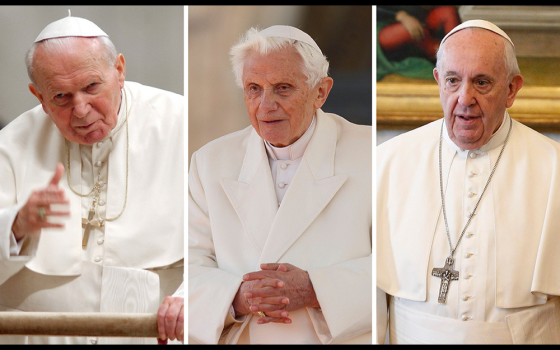"In the same way, anyone of you who does not renounce all his possessions cannot be my disciple."
These were the closing words of our Gospel reading on Sunday, from the Gospel of Luke, 14:33. It is strange to me that some of our fundamentalist friends neglect to cite this passage when they are raising money. And those Catholics who argue against even the possibility of any alteration in the church's discipline regarding communion for the divorced and remarried because of the Lord's "clear words" on the subject, do they, too, cite these "clear words" and forgo raising any funds at their church or Catholic ministry? Of course not.
Yet, these words, which may have been hortatory in the original and are certainly understood to be so now, do point to the corrupting power of money. Like power or fame or other things that glimmer in the mind's eye as desirable, the desire to acquire money can corrupt even those who approach their fundraising with the best of intentions.
There is always an "ick" factor about fundraising, or should be, which is one reason Hillary Clinton's ties to the Clinton Foundation raises eyebrows: The foreign donors had sufficient stature to request and receive a meeting with the secretary of state, but the fact that they gave a bucket load of cash suggests they might be seeking favored treatment. Similarly, Sen. Bernie Sanders and Donald Trump campaigned against the special interest money funding their opponents, although they misstated the problem. The problem is not that Clinton or Jeb Bush would change a public position in exchange for a donation. The problem is that the ability to raise money gives special interest groups power in Washington, power that prevents common ground on their issue, and a distorted sense of the importance of a given issue. So far from greasing the skids, the real problem with special interest money is that those who espouse the opposite position form equally well-funded special interest groups, and the result is gridlock.
But, listening to Jesus' strong words at Mass Sunday, I thought of a different danger that money presents. I worry about the degree to which bishops have become fundraisers and how this task exposes them to the thoughts and biases of the wealthy. It is not an entirely new problem. In 1917, Cardinal James Gibbons appealed to Charles Schwab, of Bethlehem Steel, to donate land and funding for a new Catholic church near his plant at Sparrows Point. "I do not have to urge that a Catholic church, especially in places made up of workingmen, is a tremendous power for conservatism, virtue, and industry," the cardinal wrote. Still, most of the infrastructure of the Catholic church in the U.S. was not the result of big dollar donors. Women religious provided the workforce for our schools and our hospitals. The pennies of the poor built the parishes, and those same parishioners organized the St. Vincent de Paul societies to help the indigent. Only in recent years did a bishop have to begin spending a lot of his time raising money from the very wealthy.
Our Catholic schools are a life preserver, thrown into the inner cities of America for those families trapped in poverty but with the desire to access a quality education as a means out of that poverty. Our Catholic charities are second to none: In many states, they are the largest provider of social services, a human link from government program to those in need. If a bishop has to restore his cathedral, the bill can go into the tens of millions of dollars. For all these programs, bishops must seek big donor funding, invite the fat cats over for dinner, stroke the Knights of Malta, and generally spend time cultivating very wealthy people who are accustomed to being cultivated in very sumptuous ways.
It is this last point that differentiates the contemporary bishop from mendicant friars: Both begged, but the mendicant begged daily and for his sustenance. The bishop is expected to put on a splendid dinner, or at least an elegant cocktail party, to make sure the people being solicited are made to feel special. He must stroke their egos and promise to give a speech at the next Legatus meeting.
The boards of Catholic universities are no longer composed of people with a keen commitment to the future of Catholic higher education so much as they are now peopled with fats cats or those who know how to separate fat cats from their money. I once heard one such fat cat talk about his decision to fund a Catholic parochial school in the inner city that was in danger of closing. He said something like, "The place was going to close. I stepped in to save it and to run. I mean, how hard can it be to run a school?" I thought to myself, "This man, so full of himself, has no idea how challenging it is to run a school. He is talking about buying this school the way he probably talks about buying a new car." It was appalling.
It is also the norm. Many rich folk look at their material success and view it as confirmation of their human and moral worth, and as their material wealth is greater than that of the average Joe, so must their human and moral worth be greater. Their piety may be genuine but it is narrow. Think the character of Lady Marchmain in Brideshead Revisited. The rich turn to groups like the Acton Institute or the Napa Institute, which are thoroughly corrupt intellectually and morally, to devise an alternate theory of Catholic social thought that justifies them in their prejudices and confirms them in their entitlements. Acton and Napa, in turn, fly in bishops from around the world, and wine and dine them to cover their intellectual and moral poverty with a veneer of religious endorsement.
I do not believe that most bishops or university presidents are personally corrupt. They would not do something they perceive as morally wrong in order to secure a larger check. No, the corruption about which I am speaking manifests itself differently. When workers at a Catholic university attempt to organize a union, and the university president opposes the effort and employs the language of union-busting corporate titans, a kind of moral and intellectual corruption has occurred: The president repeats what he has heard from his board and forgets Rerum Novarum. When a bishop downplays issues of social justice like income inequality so as not to offend major donors, or because he has himself come to believe what those donors say about the economy, a kind of moral and intellectual corruption has occurred.
God bless those rich people who give large chunks of money to help the poor. But, the church owes the poor more than charity. We owe them justice and an appreciation for their dignity. Their voices, as well as their needs, deserve a place in the mind and heart of a bishop. On this the day after Labor Day and having heard that powerful passage from Luke, I ask my bishop friends these questions: Do you seek to get to know the poor as well as you know the rich? To hear their stories and their perspectives? Do you make them agents of their own lives as those lives form part of the life of the church, or are they merely objectified? Do you look at the poor as the true treasures of the church, and ask yourself what that designation implies for our current social and economic structures?
[Michael Sean Winters is NCR Washington columnist and a visiting fellow at Catholic University's Institute for Policy Research and Catholic Studies.]


